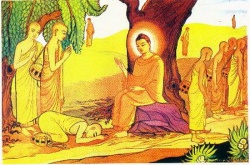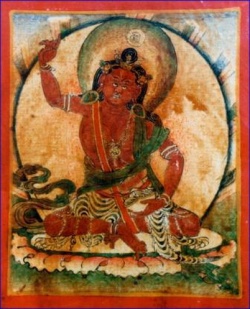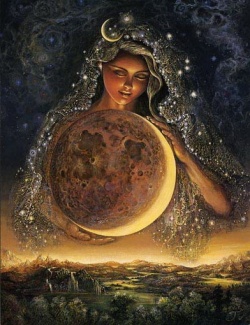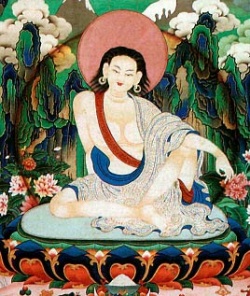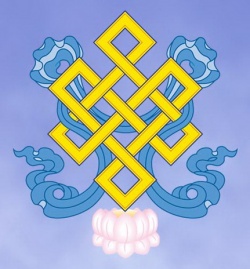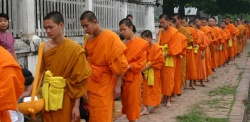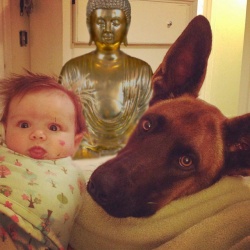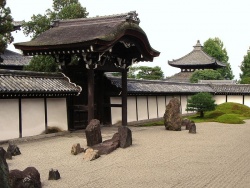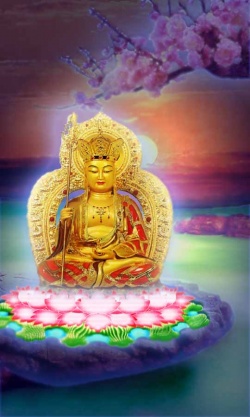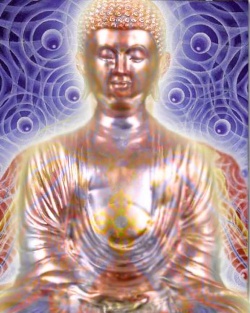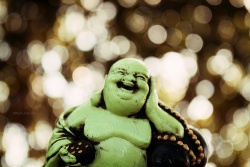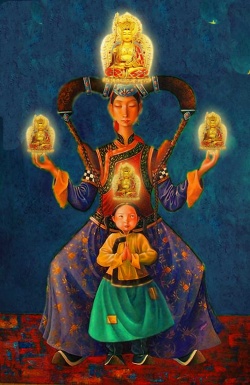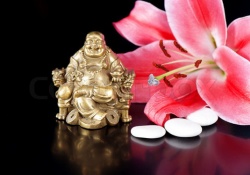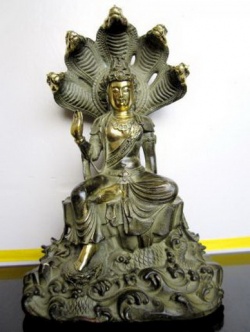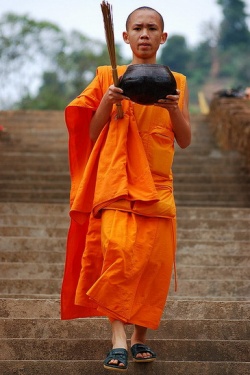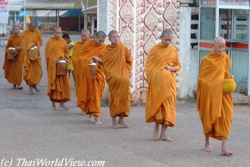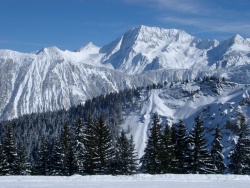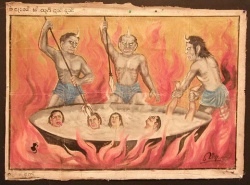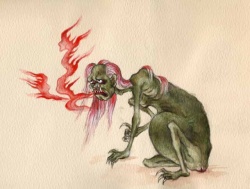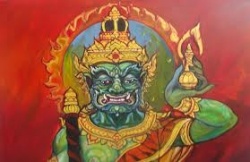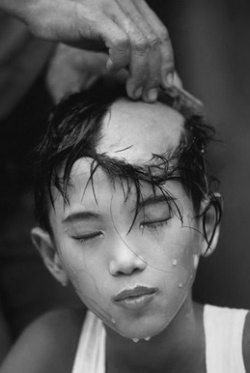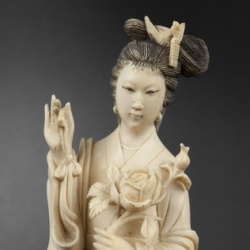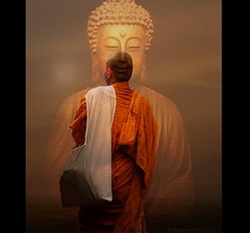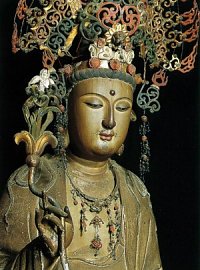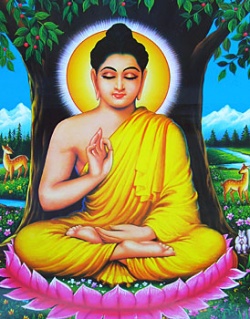Dharma Realm
Dharma realm (falingyu)
This is the general term for the "things", noumenal or phenomenal.
In Buddhism, there are ten states of existence, which are also called Ten Dharma Realms.
Each Dharma realm has its own characteristics, and its existence is attributed to the retribution of the beings.
These ten realms do not appear to be discrete in their forms, as their existence is virtually determined by the state of mind.
Therefore, it is important to note that the ten Dharma realms are not beyond a single thought.
The lowest six realms are known as the Six Paths or Six Realms of Rebirth.
These six states of existence are subjected to birth and death, and then rebirth for many lives.
One's state of existence depends on one's karmic activities.
With evil karmic power, one will be born in the lowest three realms, known as Three Evil Path (of transmigration).
With good and kind karma, one will be born in the upper three realms, known as Three Good Paths (of transmigration).
The upper four realms are known as the Four Holy Realms.
These four states of existence are beyond birth and death and liberated from the Samsara.
The Ten Dharma Realms consist of:
- Six Realms of Rebirth 6 Realms of Rebirth
- Four Holy Realms
- Sravaka (Sound-Hearer Arhat)
- Praetyka-Buddha (Those enlightened to conditions)
- Bodhisattva
- Buddha
1. Hell
Suffering is most severe, continuous and everlasting.
Those beings must have committed unforgivable and evil deed, with no regret or repent.
The evil karma determines their existence in hell.
They suffer until they are completely retributed or the evil karma vanishes.
However, for those who committed the Five Offences (deadly sins), they will stay in hell without any specific time to be liberated.
The five rebellious acts or five deadly sins are:
- killing one's father
- killing one's mother
- killing an Arhat
- shedding the Buddha's blood
- creating disharmony among the Sangha.
The performance of good or bad deeds, symbolise one's ascending to the heavens or descending to Hell under the law of karma.
It is not the judgement of any Buddhas or gods, nor is it the judgement of any Supreme God;
it is in respect to everyone's wishes and it manifests accordingly.
In the eyes of the good people there is no Hell, because they do not have karma with it.
In the eyes of the bad people, there is a manifestation of Hell, because Hell is the manifestation of their minds.
Simply, it is one's own conscience punishing one's own sins.
The sufferings of Hell include unlimited coming alive and dying within a single day.
The hell that has the most suffering is the Avici Hell.
The suffering of Avici Hell is clearly described in the Ksitigarbha Sutra.
The first suffering is uninterrupted time, meaning there is no rest.
The suffering is continuous, there is no respire for even one minute or one second.
The second suffering is uninterrupted space.
In Avici Hell, space is filled with one or many persons.
If there is a lot of space, a person will multiply himself until he occupies all the space.
So this hell can be full with only one person.
The third is uninterrupted suffering. One has to suffer all the kinds of suffering in the world.
There is no hell which has more suffering than this Avici Hell. Such suffering is called unlimited suffering.
The fourth suffering is uninterrupted grade, meaning this hell does not differentiate, whether one is a god in heaven,
a human in the human realm, a hungry ghost within the ghost realm or an animal within the animal realm.
If one "qualified", anyone can enter Avici Hell and receive the same treatment.
The fifth suffering is uninterrupted life.
There are numerous lives and deaths within a day and a night, and, between one life and one death, one suffers.
2. Ghost
In this realm, most of the ghosts always live in the atmosphere of anxiety, illusion and fear.
Their desires are never satisfied.
The hungry ghosts cannot eat as their throat is as narrow as a pin, but their stomach is as large as a drum.
Apart from hungry ghosts, there are also Yaksa, Raksa, Spiritual Ghosts, etc..
Spiritual ghosts are dwelling in the nature, e.g. trees,
mountains and seas, and protecting the creatures, while Yaksa and Raksa are evil, malignant and violent.
If one wants to avoid descending into the Realm of the Hungry Ghost, one has to learn to control one's desires.
One cannot have an insatiable desire.
In general, the desires of humans are for money, sex, fame, food and sleep.
If one desires wealth, one should reason that life only lasts for several decades, and that this body is illusive and will soon vanish once one dies.
One should be satisfied once one has enough money to spend.
One should not enslave one's body and mind to constantly pursue wealth causing a disturbance in one's body and mind and making one a slave to acquisition.
Such a person, when he or she dies, will most likely fall into the Realm of the Hungry Ghost because of insatiable desire.
If we constantly contemplate this, erroneous thoughts in desiring wealth will slowly disappear.
An insatiable desire for sex is also one of the greatest desires of humans.
If one wants to avoid it, one should cultivate the meditation on impurity. Impurity means the impurity of the physical body.
Outwardly, the body is beautiful. Inside are bones covered with offensive smelling meat.
The sensual enjoyments of sight, smell, sound and taste are only temporary.
The beautiful body is fleeting, like dew, a dream, a bubble or lightning.
We must not become attached to such illusive beauty, for such attachment is a major obstacle in our cultivation.
Everything should be viewed naturally - not because beauty has moved our hearts.
In this way, we will not be greedy towards the temporary enjoyments of sight, smell, sound, taste, and touch.
Concerning fame, few people in the world remain unattached to it,
especially in the face of the ancient saying, "People strive to prove their worth, and the Buddha strives to prove His honor."
The problem concerning fame is pronounced.
Think about this: throughout history, how many people have pursued fame and fought for it?
And how many of them can really be remembered? The world is changing all the time and sentient beings transmigrate and regenerate.
Life on earth is even shorter; very soon it will be all over like bubbles and the dream flower.
Even the physical body does not last forever, much less fame and honor.
If one does not exist, where is one's foothold for fame? So, whether it is slander or praise, we should follow our conscience to uphold our integrity and avoid asking for fame.
Then the greed for fame will subside and an honorable name will be formed from generation to generation.
Indulging in the desire for good food will become serious.
It seems to be a small matter, but the harm it will cause is great.
We cannot have unrestricted desire for good food because, if we have insatiable appetites and are constantly changing our taste, it will be very easy to commit killing of an animal.
Furthermore, indulging in too much in food increases the cruel side of our nature and encourages our animalistic sexual desires.
This will become a major obstacle in our cultivation. Therefore, it is better to treat food lightly and consume only pure food.
Next, we must consider the fondness for sleep. We have to put a limit here, too.
If we are overly desirous of its comfort, it will encourage laziness and increase drowsiness.
The mind will veer off the righteous path toward evil.
Isn't this horrible?
Hungry ghosts are hungry all the time, if they find food and put it into their mouths, it will change into flames, burning their mouths.
They are starving, yet they cannot eat.
So "hunger" is the major suffering, and that is why this realm is called the Realm of Hungry Ghosts.
The Realm of Hungry Ghosts is a form of punishment for greed.
This is one of the three lower realms of existence (the other two are the Animal Realm and Hell).
3. Animal
It is a special path.
All the beings within the Six Realms which do not belong to any other five realms are categorised in this path. Animals can exist in all other five paths.
Animals have minimal intelligence and consciousness.
They live in adaption to the nature.
As their behaviour follows instinct without deliberation, their karma is neutral, i.e. neither good nor evil.
We frequently see the behaviour of animals.
Many animals fight with each other and many also consume each other.
Animals also suffer from hunger and disease. Furthermore, they suffer the hot, cold, windy and rainy fluctuations of the weather.
This kind of suffering is hard for humans-the supreme beings of all creatures to imagine.
The deaths of animals are full of misery.
Mostly they are pursued and killed by their same species or a different species. Mosquito, flies, lice and worms die of disintegration. Chickens, ducks, fish, goats and pigs are killed and cooked.
Almost everything that flies in the sky, swims in the sea, or crawls on the earth, cannot escape becoming the food of humans.
Even earthworms have caught the attention of humans.
It looks as if even earthworms cannot escape ending up as a main dish on restaurant menu!
4. Asura
It is a peculiar path in the Six paths. In terms of material enjoyment and psychic power, it is similar to Deva.
However, in some aspects, it is even worse than Human Path.
The male Asura is extremely ugly, while the female is as beautiful as an angel.
The male Asura always fights with each other as they are cruel and furious. They are proud of themselves, and reluctant to learn and practise the Buddhist teachings.
Asuras is a collective term for Yaksas, Raksasas and other demons.
This realm is formless. Generally speaking, asuras have cultivated goodness and performed good deeds.
But they are very combative and they get angry very easily.
They love to compete and fight. Because they have not rid themselves of anger, they are not qualified for entering heaven and, hence, they fall into the Realm of Asuras.
These ghosts and spirits, though they have benevolent thoughts, do not have peaceful days because they are so competitive.
So, in order to avoid falling into the Realm of Nature Spirits, one must retain a heart that is compassionate, righteous, in compliance with propriety, honest and benevolent.
5. Human
It is the Dhama realm which we are most familiar with. In this realm, we have both happiness and suffering.
It is a material world, and the mind activities are always connected with the principles of matter.
Joy and happiness are limited as freedom is also limited by the body and other sensual organs of a man.
On the other hand, suffering can be the main cause or condition to allow man to possess a kind heart, thus to pursue the Buddhist Way. In this respect,
Human Path is better than Deva Path
Actually, even if one wants to be reborn as a human, it is not that simple. At the minimum, one has to observe the Five Precepts in order to be reborn as human.
The Five Precepts are:
- Avoid killing. One has to have compassion for all kinds of animals and birds. One should love them and protect them from being killed;
- Avoid stealing. One should not steal or take by force even something as small as a blade of grass or a flower, without the consent of the owner. Love thyself and be honest;
- Avoid illicit sex. Practice monogamy. All those who act against propriety and abandon themselves to carnal pleasures are considered to indulge in illicit sex,
- Avoid lying. If one distorts Truth or confuses justice with injustice, these also constitute lying;
- Avoid intoxicants. It is acceptable to use wine as a medicine.
Otherwise, if one drinks and gets drunk, it becomes a major source of evil. Therefore, it is better to stay away from intoxicants in order to avoid causing evil.
6. Deva
It is a heaven for those who are wise and kind as the retribution for their good deed.
Their major desires will be satisfied. In this path,
it is divided into Three Heavenly Realms, namely Desire Heaven Realm,
Form (or Rupa) Heaven Realm, Formless (or Arupa) Heaven Realm.
In the Desire Heaven Realm, the living beings have strong desire in material and can be easily and fully satisfied with enjoyment.
In the Form Heaven Realm, the living beings are not interested in material. Instead, their bodies and mind pursue the spiritual happiness, such as philosophy, music, art and meditation.
In the Formless Heaven Realm, the living beings do not attach to the material nor their own bodies.
They are free from any hindrances, and they live in a state of joy, freedom and psychic power. It is the wisdom and the karma of the Deva to determine which heaven realm they live in.
If ordinary people want to ascend to the heavens, they have to practice the Ten Wholesome Actions.
Once they have perfected themselves in the Ten Wholesome Actions, they are qualified to ascend to heaven.
The Ten Wholesome Actions are:
- avoidance of killing, extending to the releasing of captured living creatures, to prevent their slaughter;
- avoidance of stealing and adherence to the generosity of giving;
- avoidance of adultery and adherence to a pure life;
- avoidance of lying and, conversely, (that is, to not stir up gossip among others) and, when possible, to mediate in a quarrel;
- avoidance of filthy language (no dirty or obscene words) and, dedication to engage in Dharma talk and praise;
- avoidance of coarse language and, instead, to speak in a soft tone and advise wrongdoers to practice goodness;
- avoidance of greed, (towards fame, wealth, or lust);
- avoidance of anger (even when one encounters adversity) and, conversely to always have a compassionate heart;
- avoidance of delusion, that is, to practice the right Buddha Dharma, understand the law of Karma, and avoid devious paths.
What good is there to being born in the heavens? There are many reasons.
The gods in the heavens are wearing the best kinds of clothing, clean, fragrant, and dustless.
The crowns they are wearing emit infinite light, and are both colourful and magnificent- one can hardly find such on earth.
Moreover the bodies of the gods are subtle and light with no impurities and no foul smell.
Food and clothing come to them naturally, manifesting whenever the gods desire them.
In short, the gods can have whatever they desire; the supply is inexhaustible. There is also an inexhaustible supply of good music in the heavenly realm.
All gods emit light from their bodies, and their bathing water dries on its own.
Therefore, the five desires arising from the objects of the five senses - things seen, heard, smelled, tasted, or touched are satisfied naturally.
Moreover, the eyes of the gods are clear and far reaching.
Their spirit is always bright and luminous.
The most important question is, what are the heavens?
According to Buddhism, there are Three Heavenly Realms that contain Twenty-Eight Heavens.
In the Desire Realm, there are:
- 1) Heavens of the Four Deva-kings,
- 2) Trayastrimsa,
- 3) Yama Deva (Dwelling of Yama),
- 4) Tusita,
- 5) Nirmanarati,
- 6) Paranirmitavasavartin (Dwelling of Mara).
In the Form Realm, there are:
(a) The First Meditative Heavens which consist of:
- 7) Brahmakayika (assembly of Brahmadevas),
- 8) Brahmapurohita (retinue of Brahma),
- 9) Mahabrahman (Brahman himself);
(b) The Second Meditative Heavens which consist of:
- 10) Parittabhas (Minor Light),
- 11) Apramanabha (Infinite Light),
- 12) Abhasvara (Light and Sound);
(c) The Third Meditative Heavens which consist of:
- 13) Parittasubha (Minor Purity),
- 14) Apramanasubha (Boundless Purity),
- 15) Subhakrtsna (Universal Purity);
(d) The Fourth Meditative Heavens which consist of:
- 16) Punyaprasva (Born to Happiness),
- 17) Happiness in Love,
- 18) Brhatphala (Fruitful),
- 19) Asanjnisattva (No Thought),
- 20) Avhra (No Vexation),
- 21) Atapas (No Heat),
- 22) Sudrsa (Beautiful),
- 23) Sudarsana (Beautiful Appearance)
- 24) Akanisthas (End of Form).
In the Formless Realm, there are:
- 25) Akasanantyayatana (Abode of Infinite Space),
- 26) Vijnananantyayatana (Limitlessness of Consciousness),
- 27) Akincanyayatana (Non-Existing),
- 28) Naivasamjnanasamjnanayatana (Neither Thinking nor Non-thinking).
These Three Realms - 28 Heavens are all included in the Realms of the Heavens. According to modern scientific theory, there are numerous planets within the Universe; maybe heaven exists on one of them.
7. Sravaka (Sound-Hearer Arhat)
It is the first path of the Four Holy (or Sagely) Paths.
An Arhat is one who has attained the renunciation of all desires and no attachment to anything.
Thus he will be liberated from the reincarnation of the Six Paths as soon as his karmic causes are completely retributed.
In this path, it is the joyful state of existence beyond the worldly birth and death because they are enlightened that the worldly phenomena are unreal and impermanent.
Sravaka is enlightened while they listen to the Four Noble Truths.
Therefore, it is also known as Sound-Hearer Arhat.
8. Praetyka-Buddha (Those enlightened to conditions)
Praetyka-Buddha is also an Arhat, but more superior to the Sravaka.
They are enlightened by understanding the Law of Dependent Originations or the Twelve Links of Dependent Originations.
Arhat is devided into four grades of arhatship or fruitions or phala.
- 1.Srota-aparnna --- the one who has entered the stream of holy living.
It is the first stage of the arhat, that of a Sravaka.
- 2.Sakradagamin --- the one who comes to be born once more. It is the second grade of arhatship involving only one birth.
- 3.Anagamin --- the one who will not be reborn in this world (i.e. Six Paths), but in the Form Realm or Formless Realm, where he will attain Nirvana.
- 4.Arhan --- the one who enters Nirvana. All Karma of reincarnation is destroyed.
He also reaches a state of no-lower learning.
He is the highest Saint in Hinayana in contrast with the Bodhisattva as the saint in Mahayana.
9. Bodhisattva
Bodhisattva is an enlightened being.
However, he has the affection to other sentient beings.
With his Four Immeasurable Minds, he practises the Six Paramitas to cross over the sentient beings from suffering.
What Bodhisattvas do is to enlighten themselves, and enlighten others, benefit themselves and benefit others.
They cross over the sentient beings in pursuit of attainment of Buddhahood.
All these relationships are mutual and interdependent.
The Four Immeasurable Minds of Bodhisattva (Unlimited) are:
- 1. Kindness
- 2. Compassion
- 3. Delight
- 4. Renunciation
Paramita: It means to cross over from this shore of births and deaths to the other shore which is the Nirvana.
The Six Paramitas or means of so doings are
- (1) dana - charity/giving
- (2) sila - moral/conduct/taking precepts
- (3) ksanti - patience
- (4) virya - vigour/devotion/energy
- (5) dhyana - contemplation/meditation
- (6) prajna - wisdom.
All Bodhisattvas do not take refuge in Nirvana.
They commit themselves, by their great vows, to be reborn in any Dharma Realm to rescue the sentient beings.
There are ten stages or grades of Bodhisattva depending on the extent of their merits and virtues.
Ten Stages of Bodhisattva
These are the ten stages of development of Bodhisattva depending on their merits and virtues:
- 1.Pramudita (joy) - job at having overcome the difficulties and sufferings, now entering on the path to Buddhahood
- 2.Vimala (purity) - freedom from all possible defilement
- 3.Prabhakari (enlightenment) - stage of further enlightenment
- 4.Arcismati (wisdom) - stage of glowing wisdom
- 5.Sudurjaya (no difficulty) - stage of mastering the utmost difficulties
- 6.Abhimukhi (open way) - the open way of wisdom above definitions of impurity and purity
- 7.Duramgama (proceeding afar) - getting above ideas of self in order to save others
- 8.Acala (unperturbed) - attainment of being unperturbed
- 9.Sadhumati (discriminatory wisdom) - the finest discriminatory wisdom, knowing where and how to save, and possessing the Ten Powers
- 10.Dharma megha (law cloud) - attainment of the fertilising powers of law cloud
Ten Powers
The Ten Powers of Buddha or Bodhisattva are the complete knowledge of
- 1. what is right or wrong in every condition
- 2. what is the karma of every being, past, present and future
- 3. all stages of dhyana liberation and samadhi
- 4. the powers and faculties of all beings
- 5. the desires or moral directions of every being
- 6. the actual condition of every individual
- 7. the direction and consequence of all laws
- 8. all causes of mortality and of good and evil in their reality
- 9. the end of all beings and Nirvana
- 10. the destruction of all illusion of every kind
10. Buddha
"If there are people who wish to understand all Buddhas of the three periods of time they should contemplate the nature of Dharma Realm.
The Tathagatas (Buddhas) are made from mind alone."
Buddha is the highest state of existence of all sentient beings.
There are many titles of Buddha, but the most common ones are summarised in Ten Titles of Buddha, which represent the characteristic of Buddha.
The Ten Titles of Buddha 10 Titles of Buddha are:
- 1. Tathagata --- the Thus Come Ones
- 2. Arhat --- Worthy of offerings
- 3. Samyak-sambuddha --- Of proper and universal knowledge
- 4. Vidyacarva-sampauna --- perfect in understanding and conduct
- 5. Sugata --- skilful in leaving the world through liberation
- 6. Lokavid --- perfect and complete understanding of all worldly Dharma
- 7. Anuttara --- unsurpassed kights
- 8. Purusa-damya-sarathi --- taming heroes
- 9. Sasta deramanusyanam --- teachers of gods and people
- 10. Buddha-lokanatha or Bhagavan --- Buddha, the World Honoured Ones
Buddha also has Ten Powers, which enables him to cross over the living beings,
to perform all kinds of merits and virtues with psychic power and to dwell in liberation without hindrance.
Buddha treats all kinds of living beings to be equal.
In the course of preaching and crossing over. Buddha is fearless and confident to overcome all difficulties.
It is known as Four Fearlessness.
Four Fearlessness
There are four kinds of fearlessness, of which there are two groups:
A. Buddha's fearlessness arises from
- 1. his omniscience
- 2. perfection of character
- 3. overcoming opposition
- 4. ending of suffering
B. Bodhisattva's fearlessness arises from
- 1. powers of memory
- 2. power of moral diagnosis and application of the remedy
- 3. power of ratiocination
- 4. power of solving doubts
There are also Eighteen Different Characters of a Buddha as compared with Bodhisattva and other beings in Dharma Realms.
Eighteen Different Characters
- 1. His perfection of body (or person)
- 2. His perfection of mouth (or speech)
- 3. His perfection of memory
- 4. His perfection of impartiality to all
- 5. Serenity
- 6. Self-sacrifice
- 7. Unceasing desire to save
- 8. Unflagging zeal therein to save
- 9. Unfailing thought thereto to save
- 10. Unceasing wisdom to save
- 11. Powers of deliverance
- 12. The principle of the powers of deliverance
- 13. Revealing perfect wisdom in deed
- 14. Revealing perfect wisdom in word
- 15. Revealing perfect wisdom in thought
- 16. Perfect knowledge of the past
- 17. Perfect knowledge of the future
- 18. Perfect knowledge of the present
Buddha has a threefold body
- 1. Dharma body --- the Buddha-body in its essential nature
- 2. Retribution body --- a body of bliss, which he/she "receives" for his/her own "use" and differentiation from all other Buddha
- 3. Response and transformation body --- Buddha can appear in any form to cross over the sentient beings.
Though Buddha is the highest enlightened beings with unconceiveable spiritual power, he is unable to do the following:
- 1. to eliminate or change the karmic retribution
- 2. to cross over those who reject Buddhism
- 3. to cross over the entire sentient beings in the Dharma Realms
See also; “ten dharma realms.”


